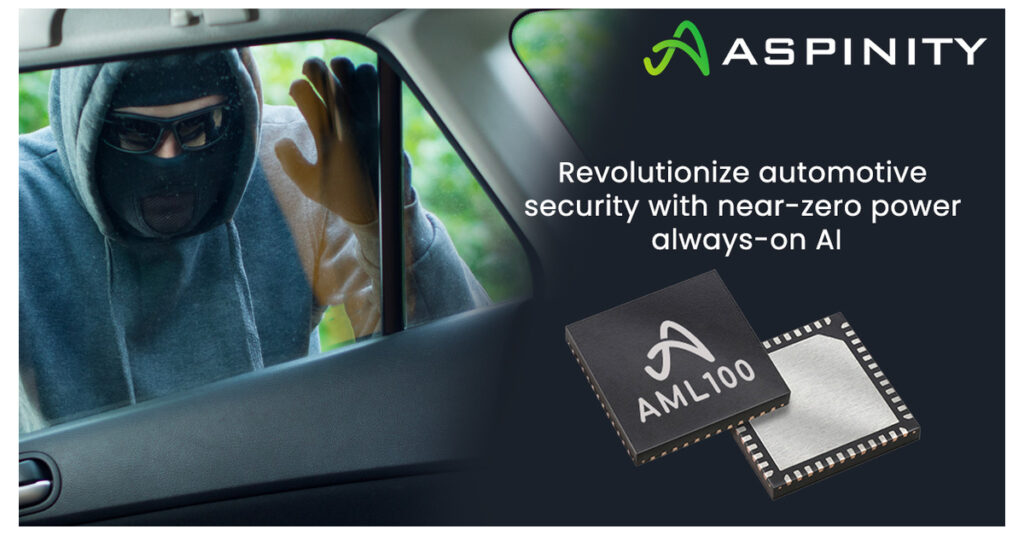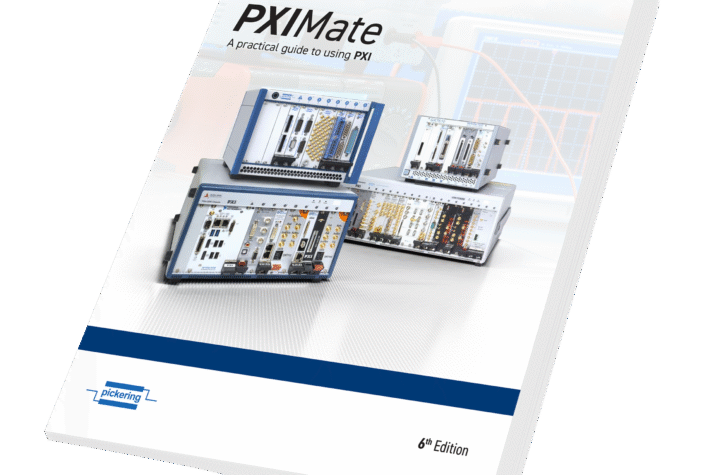
Automotive Industries interview with Richard Hegberg, Chief Executive Officer of Aspinity
In today’s era of technological advancement, where innovation is the driving force behind transformative solutions, Aspinity stands at the forefront as the leader in near-zero power AI solutions. With its groundbreaking technologies, Aspinity is revolutionizing various industries, particularly automotive, with its flagship product, the AML100, the world’s first fully analog machine learning chip. Aspinity’s automotive solutions are poised to redefine always-on monitoring in vehicles, ensuring comprehensive security and efficiency like never before.
The automotive sector is witnessing a paradigm shift in safety and monitoring systems, and Aspinity’s AML100 is at the heart of this transformation. By integrating machine learning algorithms into its analog chip, Aspinity enables precise detection of touch, scratch, contact, and collision events, providing unparalleled accuracy in automotive monitoring. Moreover, the AML100 boasts the lowest power consumption in its class, ensuring prolonged operation without draining the vehicle’s battery—a feat that sets it apart from traditional solutions.
In a recent interview with Richard Hegberg, Chief Executive Officer of Aspinity, conducted by Automotive Industries, insights were shared regarding the company’s strategic partnerships and technological advancements. Hegberg highlighted the significance of Aspinity’s collaboration with Unitrontech, a prominent distributor of automotive semiconductors, in delivering high-performance AI solutions for automotive applications. This partnership positions Aspinity to cater to the evolving needs of automotive OEMs, offering innovative technology for aftermarket and integrated security solutions.
Central to Aspinity’s innovative edge is its AnalogMLRAMP™ technology, which merges ultra-low power analog processing with machine learning capabilities. This unique approach optimizes neural network architecture, significantly reducing power consumption while maintaining superior performance. Unlike traditional digital processors, Aspinity’s analog solution operates entirely in the analog domain, eliminating the need for power-intensive digitization processes—a game-changing feature for edge-processing devices.
While Aspinity’s focus lies primarily in automotive applications, the versatility of its AnalogML™ technology extends to various domains such as home security, industrial equipment, and biomedical monitoring. The AML100’s ability to detect and classify sensor events makes it suitable for diverse applications, offering benefits in terms of accuracy, efficiency, and power consumption across different industries.
Moreover, Aspinity’s commitment to empowering developers is evident through its Python-based software development kit (SDK) for the AML100. This SDK facilitates user-friendly development, testing, and verification of analog machine learning models, unlocking endless possibilities for customization and innovation.
Looking ahead, Aspinity plans to expand its market presence by leveraging additional funding and strategic partnerships. With a focus on developing next-generation products and addressing complex applications, Aspinity aims to solidify its position as the leader in near-zero power AI solutions.
Aspinity’s innovative approach to analog machine learning is poised to revolutionize edge processing across various industries, particularly automotive. With its commitment to efficiency, accuracy, and versatility, Aspinity is paving the way for a future where always-on, power-efficient devices redefine safety, monitoring, and automation.
Automotive Industries interview with Richard Hegberg, Chief Executive Officer of Aspinity
Automotive Industries: Hi Richard, Aspinity recently secured funding from Unitrontech, a key partner in the automotive semiconductor distribution sector. How does this strategic partnership enhance Aspinity’s position in delivering high-performance, near-zero power AI solutions for automotive applications?
Hegberg: Unitrontech is a leading distributor of automotive semiconductors and a key partner of leading automotive manufacturers with an R&D center focused on comprehensive automotive industry solutions. Automotive OEMs are always looking for new and innovative technology to implement new capabilities and services. Aspinity’s near-zero power AI technology delivers parked-vehicle security with superior accuracy and without draining the battery. Together, Aspinity and Unitrontech are well positioned to deliver revolutionary solutions for aftermarket and integrated automotive security.
Automotive Industries: Aspinity’s AnalogML Analog Machine Learning technology is touted as revolutionary. Can you elaborate on how this technology uniquely merges ultra-low power analog processing with machine learning, and how it sets Aspinity apart in the market?
Hegberg: It is well understood that analog is significantly more power efficient than digital at performing certain tasks, such as the MAC function in a neural network, but its implementation has always been plagued by manufacturability, scalability, and programmability challenges. Aspinity’s AnalogML™ overcomes these challenges by using software programmable, proprietary high precision analog memory located at the compute elements to deliver an optimized neural network architecture that minimizes the number of transistors, power, and data movement. Additionally, Aspiniy’s memory is not limited to use for the MAC function – but can be applied to many different compute elements which permits trimming out variation and allows performance uniformity over environmental conditions and manufacturing inconsistencies.
Automotive Industries: While the AML100 is designed for automotive applications, Aspinity mentions its versatility in other fields like home security, industrial equipment, and biomedical monitoring. Could you share examples of potential applications and benefits in these diverse domains?
Hegberg: The AML100 is designed for detection and classification of sensor events that are unpredictable and happen sporadically. The AML100 can support up to 4 analog sensors of varying types such as microphones, piezo sensors, accelerometers, and others and also supports sensor fusion. It is Aspinity’s analogML algorithms that run on the AML100 that are developed for different applications. Similar to other machine learning algorithms, sensor data is collected in order to ‘train’ the machine learning model to detect specific events such as a window glass break, an automotive collision, a vibration anomaly on a machine belt, or a heartrate rhythm anomaly. Our Python-based analogML connect software development tool integrates with the most common machine learning frameworks in order to enable rapid custom development and simulation of analogML models – so the list of applications is endless.
Automotive Industries: The AML100 is the first product in the AnalogML™ (analog machine learning) family. What are the key features that differentiate the AML100 from other solutions in the market, and how does it contribute to reducing power consumption in edge-processing devices?
Hegberg: The AML100 is a pure analog processor that accurately detects and classifies sensor-driven events from raw, analog sensor data, allowing developers to reduce always-on system power by 95% or more. The AML100 is the only machine learning processor that interfaces to analog sensors and computes completely in analog, eliminating the power-heavy digitization of irrelevant data and dramatically reducing always-on power in IoT devices that are continually monitoring their environment. Using <20µA for inferencing, the always-on power for most applications will be <50 µA. A typical always-on power using traditional digitally-based ML processors is 10x or more. For an automotive security solution – this is the difference between a solution that can monitor a parked car for 1 day versus 10 or more days without draining the car battery.
Automotive Industries: Aspinity and Unitrontech aim to provide an always-on dashcam solution with sensor fusion and AI capabilities. How does the AML100 specifically enable this solution to detect and record only the events relevant to the car owner, enhancing both functionality and power efficiency?
Hegberg: As mentioned, the AML100’s machine learning algorithms for dashcam or other automotive solutions have been specifically trained using sensor data to detect security events related to the specific car. It will therefore ignore other types of events and/or events happening to another car.
Automotive Industries: Aspinity offers a python-based software development kit for the AML100. How does this SDK facilitate user-friendly development, testing, and verification of analog machine learning models, and what potential does it unlock for developers?
Hegberg: Aspinity’s AnalogML™ Connect is a comprehensive, Python-based SDK that enables custom design and simulation of AnalogML models for a broad array of custom applications. AnalogML Connect also includes a compiler for porting the model onto the AML100 processor for measurement, test, and further product development. The software includes multiple example applications for a quick start in learning AML100 programming concepts and creating applications using the available analog processing blocks and enables straightforward simulation and iteration of algorithm until desired event detection accuracy is achieved.
Automotive Industries: With the additional funding and strategic partnerships, how does Aspinity plan to expand its market presence, and are there any upcoming applications or industries you foresee for the AnalogML™ technology beyond the initially targeted domains?
Hegberg: Aspinity’s first application was home security with AML100 algorithms supporting glass break, alarm tone detection, and other home security events such as leak detection. We have more recently focused on automotive security applications. AnalogML™ Connect allows customers in other industries develop their own algorithms for their applications in their markets. Additionally, we are working on our next generation product that dramatically scales the capabilities of our neural network in order to address more complex applications.
Automotive Industries: As the leader in near-zero power AI solutions, what challenges and opportunities do you foresee in the edge processing industry, especially in the context of the growing demand for always-on, power-efficient devices across various sectors?
Hegberg: The market for edge processors is growing rapidly and is being driven by latency and privacy requirements as well as the growing demand for embedded generative AI support in mobile devices. The challenge for the device developers is to minimize the tradeoffs they have to make to achieve their goals. AnalogML is the most efficient architecture for AI accelerators at the edge, so Aspinity is well positioned to address these demands with current and next generation products.












More Stories
Professional vs. DIY Tinting: What You Should Know
New updated edition of “PXIMate” reference guide for T&M engineers available from Pickering Interfaces
5 Mistakes That Can Ruin Your Car Accident Claim